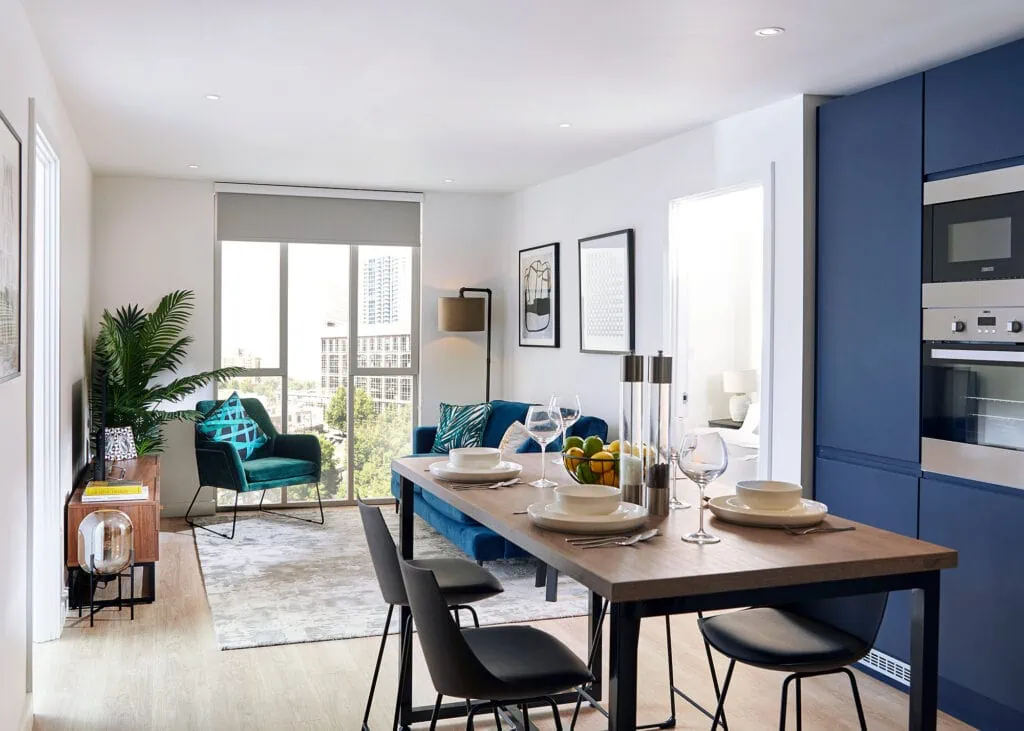The pros and cons of investing in Purpose-Built Student Accommodation (PBSA)
Before we look at the priorities and expectations of today’s rental market across the residential and student sectors, let’s take a look at the advantages and disadvantages of investing in each.
Purpose-Built Student Accommodation (PBSA)
PBSA is designed, developed and managed to deliver a high-quality living experience, and has established itself as the strongest student property sector with high demand from domestic and international students. Amenities typically include strong Wi-Fi, communal working spaces, building management and security, a gymnasium, events hubs and more. Find out more about the different types of student accommodation in our Guide.
Advantages
- High demand – By investing in UK cities with Russell Group universities, you can be sure that you’re investing in a high-demand student area with fewer periods of vacancy. Vita Student, for example, achieved an average occupancy rate of 89% (2020-2021) during the pandemic.
- Higher rental yields – As student accommodation generally costs less than residential property due to the spaces being smaller (often studio apartments), student property typically generates higher yields.
- Shared liability with a guarantor – Despite outdated beliefs that students are not an ideal tenant group due to their ‘reckless’ reputation, some investors find comfort in the shared liability with guarantors, mitigating the risk of missed payments.
- Rental guarantee options – Reputable developers often offer a rental guarantee period on off-plan student property, significantly reducing your investment risk and offering peace of mind as the new property establishes itself in the local market.
- Fully managed – Typically, PBSA is fully managed, meaning a hands-off, hassle-free investment for you and a seamless experience for your tenants.
Disadvantages
- Less capital growth potential – Capital growth may not be as high as residential property, but rental yields tend to be higher.
- No mortgage option – Unlike residential property, it isn’t possible to get a mortgage on PBSA, meaning investors pay the costs up front.
- Re-sale limited to investors – Student property can only be re-sold for investment purposes, whereas residential property can be sold to investors and owner occupiers.

The pros and cons of investing in Residential Build to Rent Property (BTR)
In recent years, the Build-to-Rent sector has raised the benchmark for premium rental living and is the modern city-centre home of choice for millions across the UK. Emerging as a sector, Build to Rent accounted for just 4.2% of all new build completions in 2018, climbing to 5.8% in 2019 and to a further 6.6% last year. Directly responding to the tenant demands of today, amenities typically include access to strong Wi-Fi, communal outdoor space, co-working areas, resident hubs, a gymnasium, a pet-friendly policy and more.
Advantages
- Capital growth – This type of residential property in prime city-centre locations generally appreciates in value over time. Factors such as buying off plan, town regeneration, improving connectivity and up-and-coming areas, can all result in capital growth over time.
- High-demand locations – Build to Rent apartments are usually located in prime city-centre locations with a supply-demand imbalance. Manchester, for example, has seen a 69% year-on-year increase in enquiries on rental properties, according to Rightmove.
- Demand from ‘aspirational renter’ – The term given to mid-to-high earning young professionals who rent luxury property in city centres, aspirational renters are typically millennials (born between 1980-1996). As over one third of millennials will now rent their entire lives, tenants are willing to pay more for their living experience than ever before.
- Tenant referencing process – Whilst student accommodation relies on the security of a guarantor, residential investors are able to rely on the tenant referencing process carried out by the rental management partner.
- Long-term tenancy – Unlike student accommodation, residential property has less risk of vacant periods in off-study months.
- Different furnishing options – Whereas students usually require fully furnished homes, residential property allows investors to choose whether to furnish or part furnish their property.
Disadvantages
- Higher price entry point – Due to the size per square foot and predictions for capital growth, luxury apartments are more expensive to buy than student property.
- No rental guarantee period – Unlike student property, it is very unusual for BTR developers to offer a rental guarantee period as the development establishes itself in the market.

Understanding your tenants
Although both tenant groups are of different demographics, there are many similarities in the expectations of today’s property rental market. Amenities such as access to strong Wi-Fi, a gymnasium, co-working space and communal outdoor areas are non-negotiables for many tenants across both groups – trends accelerated by COVID-19.
Let’s compare the top priorities of both groups:
In Knight Frank’s 2021 survey, students living in PBSA were asked which amenities they’d be willing to pay a premium for. Here are the top 5:
- Fast Wi-Fi included (66%)
- Larger bedroom (55%)
- On-site gym (51%)
- 24-hour security (45%)
- On-site laundrette (42%)
Similarly, according to JLL’s 2020 report, Home is… for everything, the top tenant priorities in the residential market were:
- Strong Wi-Fi
- Larger living areas
- Access to outdoor space
Other priorities across both tenant markets are bright and modern interiors, high-quality white goods and 24-7 management. All amenities and services mentioned are priorities of today’s purpose-built developments across both sectors, so by choosing the right developer, investors can rest assured that the demands of their markets are met.

Property consultant advice
When it comes to making any property investment, the first step is to have a conversation with a property consultant, who will talk to you about your property investment goals, preferences and budget so they can recommend the most suitable options for you. They will then go through projected yields, capital growth, payment options and answer any other questions you may have. For residential property with mortgage options available, you should seek professional advice from a mortgage broker.
As is the case with any investment, you should conduct thorough research before making your decision. Here are a list of considerations to discuss with your property developer:
Location
For Build to Rent property, make sure your development is in a high-demand location with a strong economy, increasing population and high projected growth. Cities such as Manchester and Birmingham are performing exceptionally well, as the North West leads the housing boom with prices up 15%. As for prime PBSA cities, developments within walking distance of Russell Group universities are reliable high-demand investment locations.
Building and tenant management
Both sectors offer fully-managed options, giving the investor a hands-off, hassle-free approach and giving their tenants a seamless experience. For more hands-on investors, residential properties can be managed and tenanted independently.
Rent price expectations
Rent price varies depending on apartment specification, size and location. But by offering luxury amenities and facilities, tenants across both groups will be willing to pay a premium at the higher end of the rental market.
Developer credibility
It’s important to make sure you are investing with a credible developer who can demonstrate a strong property portfolio of successful developments and years of real estate experience. Positive investor and tenant testimonials are also a good indication of reputation.
How to invest with Select Property Group
Whether your priority is higher rental yields, capital growth over time, or a hands-off investment from overseas, we can help you find the right investment for you.
At Select Property Group, we offer an end-to-end service for investors – from initial consultation right through to exit strategy via our in-house brokerage. Investing with us starts with a conversation with one of our property consultants, who will talk you through the process from start to finish, arrange a virtual or face-to-face tour and be on-call to answer any questions you may have.
If you need further guidance to decide, get in touch with one of our property consultants at info@selectpropedev.wpengine.com to arrange a call.
